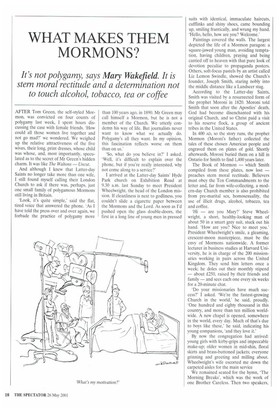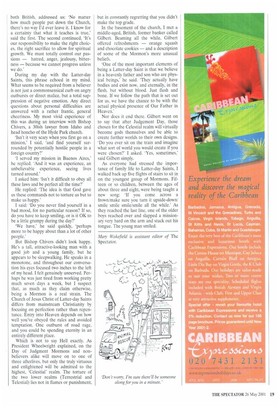WHAT MAKES THEM MORMONS?
It's not polygamy, says Mary Wakefield. It is
stem moral rectitude and a determination not to touch alcohol, tobacco, tea or coffee
AFTER Tom Green, the self-styled Mormon. was convicted on four counts of polygamy last week, I spent hours discussing the case with female friends. 'How could all those women live together and not go mad?' we wondered. We weighed up the relative attractiveness of the five wives, their long, print dresses, whose child was whose, and, most importantly, speculated as to the secret of Mr Green's hidden charm. It was like The Wahons — Uncut.
And although I knew that Latter-day Saints no longer take more than one wife, I still found myself calling their London Church to ask if there was, perhaps, just one small family of polygamous Mormons still living in Britain.
'Look, it's quite simple,' said the flat, tired voice that answered the phone. 'As I have told the press over and over again, we forbade the practice of polygamy more than 100 years ago, in 1890. Mr Green may call himself a Mormon, but he is not a member of the Church. We utterly condemn his way of life. But journalists never want to know what we actually do. Polygamy's all they want. In my opinion, this fascination reflects worse on them than on us.'
'So, what do you believe in?' I asked. 'Well, it's difficult to explain over the phone, but if you're really interested, why not come along to a service?'
I arrived at the Latter-day Saints' Hyde Park church on Exhibition Road at 9.30 a.m. last Sunday to meet President Wheelwright, the head of the London mission. If cleanliness is next to godliness, you couldn't slide a cigarette paper between the Mormons and the Lord. As soon as I'd pushed open the glass double-doors, the first in a long line of young men in pressed suits with identical, immaculate haircuts, cufflinks and shiny shoes, came bounding up, smiling frantically, and wrung my hand. 'Hello, hello, how are you? Welcome.'
Paintings covered the walls. The largest depicted the life of a Mormon paragon: a square-jawed young man, avoiding temptation, having children, praying and being carried off to heaven with that pure look of devotion peculiar to propaganda posters. Others, soft-focus pastels by an artist called Liz Lemon Swindle, showed the Church's founder, Joseph Smith, staring nobly into the middle distance like a Landseer stag.
According to the Latter-day Saints, Smith was visited by a resurrected form of the prophet Moroni in 1820. Moroni told Smith that soon after the Apostles' death. God had become disenchanted with his original Church, and so Christ paid a visit to his reserve flock, a group of ancient tribes in the United States.
In 400 AD, so the story runs, the prophet Mormon (Moroni's father) collected the tales of these chosen American people and engraved them on plates of gold. Shortly afterwards, Moroni buried them on a hill in Ontario for Smith to find 1,400 years later.
The Book of Mormon — which Smith compiled from these plates, now lost — preaches stern moral rectitude. Believers must obey the Ten Commandments to the letter and, far from wife-collecting, a modern-day Church member is also prohibited from pre-marital sex, homosexuality, the use of illicit drugs, alcohol, tobacco, tea and coffee.
'Hi — are you Mary?' Steve Wheelwright, a short, healthy-looking man of about 50 in a smart grey suit, stuck out his hand. 'How are you? Nice to meet you.' President Wheelwright's smile, a gleaming, crescent-moon masterpiece, must be the envy of Mormons nationwide. A former lecturer in business studies at Harvard University, he is in charge of the 200 missionaries working in pairs across the United Kingdom. They send him letters once a week; he doles out their monthly stipend — about £250, raised by their friends and family — and sees each one every six weeks for a 20-minute chat.
'Do your missionaries have much success?' I asked. 'We're the fastest-growing Church in the world,' he said, proudly. 'One hundred and eighty thousand in this country, and more than ten million worldwide. A new chapel is opened, somewhere in the world, every day. Much of that's due to boys like these,' he said, indicating his young companions, 'and they love it.'
By now the congregation had arrived: young girls with kirby-grips and impeccable make-up; older women in mid-shin, floral skirts and brass-buttoned jackets; everyone grinning and greeting and milling about. Wheelwright's wife escorted me down the carpeted aisles for the main service We remained seated for the hymn, 'The Morning Breaks', which was the work of one Brother Careless. Then two speakers, both British, addressed us: No matter how much people put down the Church, there's no way I'd ever leave it. I know for a certainty that what it teaches is true,' said the first. The second continued, 'It's our responsibility to make the right choices, the right sacrifice to allow for spiritual growth. We must totally control our passions — hatred, anger, jealousy, bitterness — because we cannot progress unless we do.'
During my day with the Latter-day Saints, this phrase echoed in my mind. What seems to be required from a believer is not just a commonsensical curb on angry outbursts or direct malice, but a total suppression of negative emotion. Any direct questions about personal difficulties are answered with a rather frantic, general cheeriness. My most vivid experience of this was during an interview with Bishop Chivers, a 30ish lawyer from Idaho and head honcho of the Hyde Park church.
'Isn't it very scary when you first go on a mission,' I said, 'and find yourself surrounded by potentially hostile people in a foreign country?'
'I served my mission in Buenos Aires,' he replied. 'And it was an experience, an unbelievable experience, seeing lives turned around.'
I asked him: 'Isn't it difficult to obey all these laws and be perfect all the time?'
He replied: 'The idea is that God gave us these commands not to torture us but to make us happy.'
I said: 'Do you never find yourself in a bad mood, for no particular reason? If so, do you have to keep smiling, or is it OK to be a little grumpy during the day?'
'We have,' he said quickly, 'perhaps more to be happy about than a lot of other people.'
But Bishop Chivers didn't look happy. He's a tall, attractive-looking man with a good job and a young family, but he appears to be sleepwalking. He speaks in a monotone, and throughout our conversation his eyes focused two inches to the left of my head. I felt genuinely unnerved. Perhaps he was just tired from working pretty much seven days a week. but I suspect that, as much as they claim otherwise, being a Mormon is a real strain. The Church of Jesus Christ of Latter-day Saints differs from mainstream Christianity by focusing on perfection rather than repentance. Entry into Heaven depends on how well you've obeyed the rules and avoided temptation. One outburst of road rage, and you could be spending eternity in an entirely different place.
Which is not to say Hell exactly. As President Wheelwright explained, on the Day of Judgment Mormons and nonbelievers alike will move on to one of three afterlives. but only the truly virtuous and enlightened will be admitted to the highest, 'Celestial' realm. The torture of the two lower realms (Terrestrial and Telestial) lies not in flames or punishment, but in constantly regretting that you didn't make the top grade.
In the basement of the church, I met a middle-aged, British, former banker called Gilbert. Beaming all the while, Gilbert offered refreshments — orange squash and chocolate cookies — and a description of some of the Mormon's more unusual beliefs.
'One of the most important elements of being a Latter-day Saint is that we believe in a heavenly father and son who are physical beings,' he said. 'They actually have bodies and exist now, and eternally, in the flesh, but without blood. Just flesh and bone. If we follow the path that is set out for us, we have the chance to be with the actual physical presence of Our Father in Heaven.'
Nor does it end there. Gilbert went on to say that after Judgement Day, those chosen for the Celestial realm will virtually become gods themselves and be able to create further worlds to their own designs. 'Do you ever sit on the train and imagine what sort of world you would create if you were chosen?' I asked. 'Yes, sometimes,' said Gilbert simply.
As everyone had stressed the importance of family life to Latter-day Saints, I walked back up five flights of stairs to sit in on the youngest group of Mormons. Fifteen or so children, between the ages of about three and eight, were being taught a new song: 'If you come across a frown/make sure you turn it upside-down/ smile smile smile/smile all the while.' As they reached the last line, one of the older boys reached over and slapped a missionary very hard on the arm and stuck out his tongue. The young man smiled.
Maly Wakefield is assistant editor of The Spectator.



















































































 Previous page
Previous page